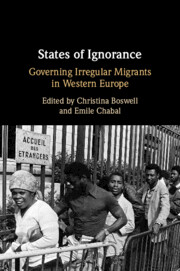Book contents
- States of Ignorance
- States of Ignorance
- Copyright page
- Contents
- About the Editors and Contributors
- Acknowledgements
- Introduction
- 1 States, Knowledge and Ignorance
- 2 The Post-war European State and (Irregular) Migration
- 3 The Invention of Illegal Immigration
- 4 (Im)perfect Control
- 5 From Ignorance to Illegalisation
- 6 Denial, Elucidation or Resignation? British and German State Responses to Unauthorised Migrants
- 7 To See or Not to See
- 8 European Integration and the Leap into the Unknown
- 9 Control Infrastructures and Ignorance
- Index
- References
5 - From Ignorance to Illegalisation
The Demise of the UK’s Non-individualised Immigration Control System, 1962–1971
Published online by Cambridge University Press: 02 November 2023
- States of Ignorance
- States of Ignorance
- Copyright page
- Contents
- About the Editors and Contributors
- Acknowledgements
- Introduction
- 1 States, Knowledge and Ignorance
- 2 The Post-war European State and (Irregular) Migration
- 3 The Invention of Illegal Immigration
- 4 (Im)perfect Control
- 5 From Ignorance to Illegalisation
- 6 Denial, Elucidation or Resignation? British and German State Responses to Unauthorised Migrants
- 7 To See or Not to See
- 8 European Integration and the Leap into the Unknown
- 9 Control Infrastructures and Ignorance
- Index
- References
Summary
Until the early 1970s, UK immigration rules did not include a category of ‘illegal’ immigration. This chapter traces the shift from this largely permissive immigration regime based on the use of caps and criteria, to the more individualised approach based on illegalisation and individual punishment that emerged in the late 1960s and early 1970s. It shows how this new, individualised approach was considered by officials and the Labour government as a necessary response to political expectations, rather than a means of better steering migration. The individualised approach also necessitated - and enabled - new forms of state knowledge of irregular migrants. However, a lack of operational commitment to this approach led to relatively lax implementation, and a residual issue of limited state knowledge of unauthorised migrants.
Information
- Type
- Chapter
- Information
- States of IgnoranceGoverning Irregular Migrants in Western Europe, pp. 140 - 164Publisher: Cambridge University PressPrint publication year: 2023
